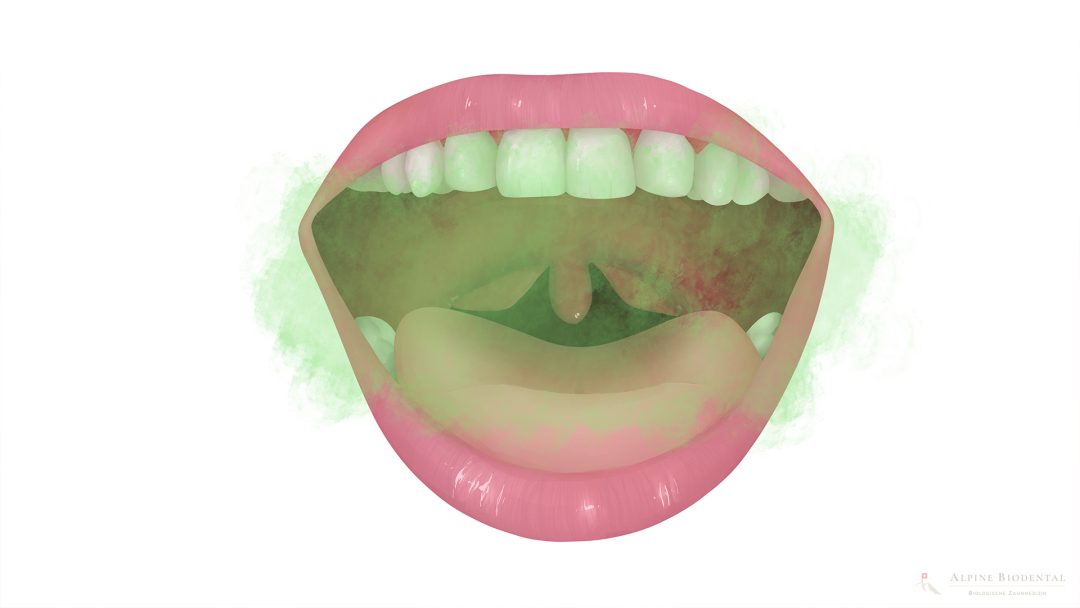Bad Breath

Bad breath, also known as Halitosis, can cause significant distress for those affected and be psychologically burdensome. However, it is not just a social problem; it can also lead to health issues.
This article focuses not on bad breath after eating but on persistent bad breath related to a physical problem.
Causes of Bad Breath
Bad breath can have various causes, resulting in different odors and intensities. In 9 out of 10 cases, the cause of bad breath or halitosis is within the oral cavity.
Putrid Bad Breath
Putrid bad breath typically arises from issues within the oral cavity. Different bacteria in the oral cavity can produce sulfur compounds, which, when exhaled, contribute to the characteristic putrid bad breath.
The problem can be exacerbated by the presence of cavities, periodontitis, or tartar. Old or improperly placed fillings and crowns can also intensify putrid bad breath.
The bad breath can be particularly pronounced in the morning upon waking up and may even develop into a fecal odor in extreme cases.
Putrid bad breath can also occur temporarily with sore throat, tonsillitis, or inflammation following wisdom tooth extraction and subsides after recovery.
Acidic Bad Breath from the Stomach
A sphincter, located between the stomach and esophagus, prevents stomach acid from reaching and damaging the esophagus. Normally closed, if this sphincter is open, it can lead to heartburn, reflux, and acidic bad breath from the stomach.
Sweet Bad Breath
A slightly sweet bad breath may be perceived in cases of severe liver problems or liver failure, known as Foetor hepaticus. Sulfur-containing molecules from the liver enter the lungs through the bloodstream and are exhaled, making the sweet odor detectable through the mouth and nose.
Acetone Bad Breath
A bad breath with an acetone odor (also known as acetone or ammonia) can occur in diabetes patients, provided there is an insulin deficiency. Due to the lack of insulin, the body is unable to process sugar, leading to an increased reliance on ketones as an energy source. The excess of ketones (ketosis) results in a bad breath with an acetone odor.
Even in diets without carbohydrates and sugar, the body is compelled to resort to fat burning, elevating the levels of ketones in the blood and consequently causing an acetone bad breath.
These ketones are exhaled through the lungs, making a noticeable acetone odor emanate from the mouth and nose.
What to do against Bad Breath?
Many affected individuals wonder what can be done about bad breath. Since the cause of bad breath is often within the oral cavity, the first step is to consult an experienced dentist. The dentist can discuss the causes and create a treatment plan.
Oral Microbiome
An unhealthy oral microbiome can produce increased sulfur compounds, contributing to the typical putrid bad breath. Therefore, optimizing and rebuilding the oral microbiome is crucial. Improving oral bacterial flora is ideally achieved with the help of oxygen and ozone, selectively eliminating problematic microbes and combating bad breath.
Improving daily oral hygiene and adjusting diet are essential supports for getting rid of bad breath.
The use of probiotics is minimally effective against bad breath, as oral microbes are highly resistant and not easily replaced.
Addressing Physical Causes
If bad breath is originating from the stomach, sugar metabolism (diabetes), liver, or diet, it is crucial to consult a general practitioner. A precise assessment of the cause of bad breath is important to avoid lasting health damage.
Home Remedies for Bad Breath
There are home remedies that can be tried for bad breath. However, these are usually only symptomatic support, and the underlying cause should be identified by a dentist or doctor first.
- Rinsing with Baking Soda: Dissolving baking soda in lukewarm water and rinsing several times a day can temporarily neutralize odors by buffering acids in the mouth.
- Oil Pulling: Swishing the entire mouth with coconut oil, olive oil, or another plant-based oil for about 15 minutes can bind odorous substances and loosen adhered food particles and deposits.
Bad Breath in Children
In children, bad breath almost always originates from the mouth and is due to poor oral flora. Increased consumption of sugar (sweets, chocolate) and inadequate oral hygiene at home can further amplify bad breath.
If the child is sick (e.g., with the flu), bad breath may temporarily result from tonsillitis or inflammation in the throat.
In any case, a dentist and doctor specializing in infants and toddlers should thoroughly examine the problem.
Dr. med. dent. Artur Hein
For the treatment of bad breath, we use methods aimed at building up the oral flora. After the first session, bad breath is significantly reduced.

Frequently asked Questions about Bad Breath
Bad breath can be a significant burden for those affected, prompting various questions. The following addresses frequently asked questions. If uncertainties persist, feel free to schedule an appointment with us.
If you notice you have bad breath, you should see a dentist as soon as possible. Bad breath can be the result of an underlying problem and should be investigated early.
After eating garlic, sulfur-containing garlic molecules enter the blood and are exhaled, causing garlic breath. Garlic breath cannot be neutralized but can be masked with other scents. For example, peppermint can somewhat cover the smell and make it less intense.
Depending on the person, it may take several days for the garlic odor to completely disappear.
If bad breath persists despite brushing teeth, the cause is likely related to the oral flora. This should be thoroughly examined by your dentist.
Bad breath from the stomach occurs when stomach acid escapes into the esophagus. Make an appointment with your general practitioner.
Bad breath is often more pronounced in the morning. This is due to reduced saliva flow during the night. Mouth breathing or snoring can further dry the mouth, leading to increased morning bad breath.
Bad breath can be caused by various systemic diseases, including diabetes, liver diseases, reflux, or eating disorders.
Bad breath with an ammonia odor indicates diabetes with insulin deficiency or a diet/eating disorder with a ketogenic metabolism.
Further information
Relevant information is listed below to provide you with more insight.